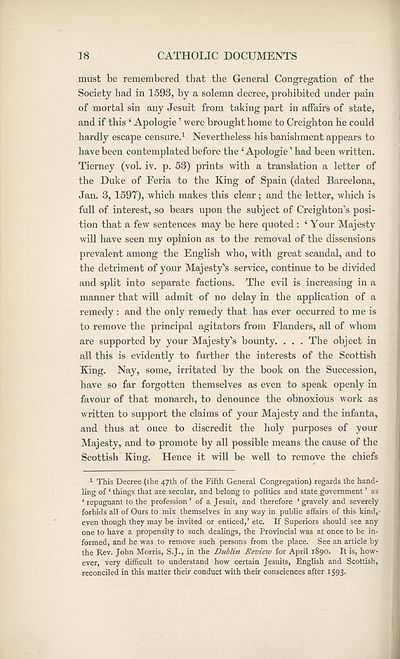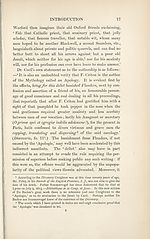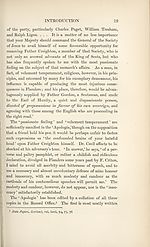Series 1 > Miscellany of the Scottish History Society (First volume)
(111) Page 18
Download files
Complete book:
Individual page:
Thumbnail gallery: Grid view | List view

18
CATHOLIC DOCUMENTS
must be remembered that the General Congregation of the
Society had in 1593, by a solemn decree, prohibited under pain
of mortal sin any Jesuit from taking part in affairs of state,
and if this ‘ Apologie1 were brought home to Creighton he could
hardly escape censure.1 Nevertheless his banishment appears to
have been contemplated before the ‘ Apologie ’ had been written.
Tierney (vol. iv. p. 53) prints with a translation a letter of
the Duke of Feria to the King of Spain (dated Barcelona,
Jan. 3, 1597), which makes this clear; and the letter, which is
full of interest, so bears upon the subject of Creighton’s posi¬
tion that a few sentences may be here quoted : ‘ Your Majesty
will have seen my opinion as to the removal of the dissensions
prevalent among the English who, with great scandal, and to
the detriment of your Majesty’s service, continue to be divided
and split into separate factions. The evil is increasing in a
manner that will admit of no delay in the application of a
remedy : and the only remedy that has ever occurred to me is
to remove the principal agitators from Flanders, all of whom
are supported by your Majesty’s bounty. . . . The object in
all this is evidently to further the interests of the Scottish
King. Nay, some, irritated by the book on the Succession,
have so far forgotten themselves as even to speak openly in
favour of that monarch, to denounce the obnoxious work as
written to support the claims of your Majesty and the infanta,
and thus at once to discredit the holy purposes of your
Majesty, and to promote by all possible means the cause of the
Scottish King. Hence it will be well to remove the chiefs
1 This Decree (the 47th of the Fifth General Congregation) regards the hand¬
ling of ‘ things that are secular, and belong to politics and state government ’ as
‘ repugnant to the profession ’ of a Jesuit, and therefore ‘ gravely and severely
forbids all of Ours to mix themselves in any way in public affairs of this kind,-
even though they may be invited or enticed,’ etc. If Superiors should see any
one to have a propensity to such dealings, the Provincial was at once to be in¬
formed, and he was to remove such persons from the place. See an article by
the Rev. John Morris, S.J., in the Dublin Review for April 1890. It is, how¬
ever, very difficult to understand how certain Jesuits, English and Scottish,
reconciled in this matter their conduct with their consciences after 1593.
CATHOLIC DOCUMENTS
must be remembered that the General Congregation of the
Society had in 1593, by a solemn decree, prohibited under pain
of mortal sin any Jesuit from taking part in affairs of state,
and if this ‘ Apologie1 were brought home to Creighton he could
hardly escape censure.1 Nevertheless his banishment appears to
have been contemplated before the ‘ Apologie ’ had been written.
Tierney (vol. iv. p. 53) prints with a translation a letter of
the Duke of Feria to the King of Spain (dated Barcelona,
Jan. 3, 1597), which makes this clear; and the letter, which is
full of interest, so bears upon the subject of Creighton’s posi¬
tion that a few sentences may be here quoted : ‘ Your Majesty
will have seen my opinion as to the removal of the dissensions
prevalent among the English who, with great scandal, and to
the detriment of your Majesty’s service, continue to be divided
and split into separate factions. The evil is increasing in a
manner that will admit of no delay in the application of a
remedy : and the only remedy that has ever occurred to me is
to remove the principal agitators from Flanders, all of whom
are supported by your Majesty’s bounty. . . . The object in
all this is evidently to further the interests of the Scottish
King. Nay, some, irritated by the book on the Succession,
have so far forgotten themselves as even to speak openly in
favour of that monarch, to denounce the obnoxious work as
written to support the claims of your Majesty and the infanta,
and thus at once to discredit the holy purposes of your
Majesty, and to promote by all possible means the cause of the
Scottish King. Hence it will be well to remove the chiefs
1 This Decree (the 47th of the Fifth General Congregation) regards the hand¬
ling of ‘ things that are secular, and belong to politics and state government ’ as
‘ repugnant to the profession ’ of a Jesuit, and therefore ‘ gravely and severely
forbids all of Ours to mix themselves in any way in public affairs of this kind,-
even though they may be invited or enticed,’ etc. If Superiors should see any
one to have a propensity to such dealings, the Provincial was at once to be in¬
formed, and he was to remove such persons from the place. See an article by
the Rev. John Morris, S.J., in the Dublin Review for April 1890. It is, how¬
ever, very difficult to understand how certain Jesuits, English and Scottish,
reconciled in this matter their conduct with their consciences after 1593.
Set display mode to:
![]() Universal Viewer |
Universal Viewer | ![]() Mirador |
Large image | Transcription
Mirador |
Large image | Transcription
Images and transcriptions on this page, including medium image downloads, may be used under the Creative Commons Attribution 4.0 International Licence unless otherwise stated. ![]()
| Scottish History Society volumes > Series 1 > Miscellany of the Scottish History Society (First volume) > (111) Page 18 |
|---|
| Permanent URL | https://digital.nls.uk/127082193 |
|---|
| Attribution and copyright: |
|
|---|
| Description | Over 180 volumes, published by the Scottish History Society, containing original sources on Scotland's history and people. With a wide range of subjects, the books collectively cover all periods from the 12th to 20th centuries, and reflect changing trends in Scottish history. Sources are accompanied by scholarly interpretation, references and bibliographies. Volumes are usually published annually, and more digitised volumes will be added as they become available. |
|---|


